Libya Shield commander denies murder, vows revenge for torched family home
By Ahmed Elumami and Maha Ellawati.
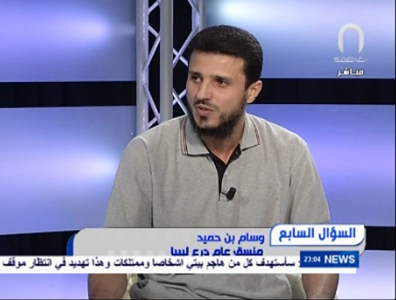
Wissam Ben Hamid this evening on Alaseema TV
Benghazi, 18 October 2013:
The commander of the Libya Shield No. 1 Battalion, Wissam Ben Hamid, spent almost two hours taking part in a TV phone-in this evening, denying that he was in any way connected with the murder earlier in the day of the Chief of Libya’s Military Police, Colonel Ahmed Mustafa Al-Barghathi. He also vowed to target the people who had burnt down his family home in Benghazi this afternoon.
Appearing in a Tripoli studio for the Alaseema channel’s “Seventh Question” show, Ben Hamid was clearly angry at highly critical comments from some of the callers, one of whom vowed to kill him if he returned to Benghazi.
Ezzedine Al-Okwak, commander of the brigade which controls Benina airport phoned to claim that he knew that Ben Ahmed had threatened Barghathi before and that he was the prime suspect for the killing. Therefore, said Okwak, if Ben Hamid returned to Benghazi through the airport, he would be killed.
Another caller was introduced by the presenter as Colonel Hamid Al-Hassi. However, the person on the other end of the line then revealed himself as Azny Barasi and proceeded to describe Ben Hamid as a “tyrant” and a “second Qaddafi”. Ben Hamid’s response was to laugh.
There were also phone calls from members of the Barghathi tribe who accused Ben Hamid of being responsible not just for today’s killing, but for the gunning down last June of 32 protestors outside the Kuwafiyah base of the Libya Shield No. 1 Battalion.
Not all the callers, however, were critical. Benghazi Congressman Saleh Gaouda, who is also a member of the National Security Committee, thanked Ben Hamid for all his work and said that he was not involved in any crime and he did not threaten the national security of Libya.
In the last part of the programme Ben Hamid was calm and relaxed. He had been introduced as a “general coordinator of the Libya Shield”. He denied that the force had any links with assassinations and explosions in Libya and Benghazi in particular. He said he thought that he had been attacked personally because some federalists believed that he was against federalism. He said that he did not have any link to any agenda.
At one point, he said that the Petroleum Facilities Guard commander in the east, Ibrahim Jadhran, who is leading the blockade of all the eastern oil export terminals except Brega, had sought to have him killed. Describing Jadhran as “an oil stealer”, Ben Hamid maintained that the PFG leader had sent people on several occasions to murder him. He said that behind Jadhran was a “smart businessman with a lot of money”. He named the individual, who, he said, was outside Libya. The businessman’s brother had sought to set up a meeting between the two of them in Qatar, explained Ben Hamid, but he had not gone because it might make it look as if he were a member of Ansar Al-Sharia.
“There are no grounds for my arrest,” he said, “ I have not received any notification from the government that recognised my involvement in any crime”.
At one point, when the presenter asked him about the Prime Minister’s abduction, Ben Hamid said that he did not wish to go into any details. He did claim, however, that Ali Zeidan had passed a list of 100 names to the Americans and that his name had been one of them.
Benghazi tense as Shield commander’s home torched following Barghathi’s assassination
By Ahmed Elumami and Maha Ellawati.
Benghazi, 18 October 2013:
The family home of Wissam Ben Hamid in the Benghazi suburb of Kuwafiyah was attacked and set on fire this afternoon by members of the Barghathi tribe who accused him of responsibility for the assassination this morning of Colonel Ahmed Mustafa Al-Barghathi, head of Libya’s Military Police.
“Four or five carloads of men came to Wissam’s house,” said an associate of Ben Hamid. “They fired RPGs and then they escaped. But pictures were taken and it is known who they are.”
It was then widely reported on social media sites that the attackers planned to move on to the homes of four other military commanders in the city: Ahmed Bukhattalah, Libya Shield commander Ismail Salabi, Ziad Belam, head of the Omar Mukhtar Brigade, and Bukah Laraibi who commands the brigade which protects the Kuwafiyah prison. All are regarded as Islamist.
Firing was heard all over the city during the evening, but there were no reports of direct clashes between the Barghathis and their supporters on the one side and the followers of the brigade leaders on the other.
However, masked guards were seen outside Bukhatallah’s house in the city’s Leithi district. Some of them were reported on social media sites to be dressed in Afghan style. There were also said to be 4×4 vehicles deployed belonging to Libya Shield No. 1 Brigade. It was further reported that black Al-Qaeda flags were seen flying in the district.
A relative of Salabi told the Libya Herald that he had been to Salabi’s house and there were also men with guns there to protect it but he thought that there would not be any clashes. “Things are quiet now,” he said. In any event, he noted, it would be difficult for anyone to attack Bukhattalah’s or Salabi’s homes. Unlike Ben Hamid’s family home in Kuwaifiyah, an area which he said was controlled by the Barghathis, the two houses were in narrow streets and surrounded by the homes of friends and supporters.
Reports that reinforcements from Derna were heading to the city in support of Bukhattalah and the other brigade leaders are said to have resulted in other tribes allied to the Barghathis setting up road blocks to prevent stop them.
There is a history of animosity between Ben Hamid, who heads the Libya Shield No.1 Brigade, and the Barghathis. In June, members of the Barghathi tribe were prominent among those who marched to the brigade’s base in Kuwafiyah demanding its closure. The protest then degenerated into clashes in which 32 people were shot dead. The brigade was widely blamed for the killings.
Charges were filed in Washington against Bukhattalah in August accusing him of involvement in the assault on 11 September last year on the US diplomatic compound in Benghazi which resulted in the death of US Ambassador Chris Stevens and three other American staff.
Military Police chief assassinated outside Benghazi home
By Maha Ellawati.
Benghazi, 18 October 2013:
The Chief of Libya’s Military Police, Colonel Ahmed Mustafa Al-Barghathi, was shot outside his house in the Greysh district of Benghazi this morning, when leaving for mosque.
Barghathi was seriously injured by the gunfire and was taken to Benghazi’s Jala hospital. He died on the operating table, according to the spokesman for Benghazi Joint Security Room, Abdullah Al-Zaidi.
His body was then transferred to Benghazi Medical Centre for preparation for burial this afternoon.
and....
http://english.alarabiya.net/en/News/middle-east/2013/10/18/Libya-military-police-chief-killed-in-Benghazi-.html
Last Update: Friday, 18 October 2013 KSA 17:22 - GMT 14:22
Libya’s military police chief killed in Benghazi
Al Arabiya
Unknown assailants gunned down Libya’s military police chief, Colonel Ahmed Mustapha al-Barghathi, Friday in the restive eastern city of Benghazi, security services said.
Gunmen shot Barghathi outside his home, Colonel Abdullah al-Zaidi, spokesman for the security services, told Agence France-Presse.
Zaidi said Barghathi died of head and chest wounds at the Mediterranean city’s al-Jala hospital
Meanwhile, a source told Reuters, that “several shots hit Barghathi. He was brought to hospital but later died there.”
Barghathi, a former rebel
Barghathi, who was a former rebel leader in the 2011 uprising that toppled longtime dictator Muammar Qaddafi, was the first officer in the former regime’s army to defect and form a rebel force in the revolt, Zaidi said.
While Benghazi was the cradle of the uprising that ousted Qaddafi’s regime, it has since seen a series of assassinations targeting officers in the security services.
Most recently, Libyan Prime Minister Ali Zeidan was briefly kidnapped by gunmen in Tripoli.
Other attacks have targeted Western interests and diplomats, and much of the violence has been attributed to radical Islamists, including the killing of U.S. ambassador Chris Stevens and three other Americans in an attack on the U.S. mission last year.
Libya is struggling to assert control over militias and radical Islamists two years after Qaddafi’s toppling. The government is also still struggling to rein in tribal militias and groups of former rebels.
The shooting of Barghathi, who was on vacation in the city, is the highest profile attack there for weeks, according to AFP.
Some former rebel groups now in theory help the government maintain security, but are themselves often a source of violence.
War crimes news.....
Senussi asks again to be tried in the Hague
By Nigel Ash.
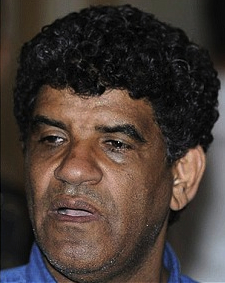
Abdullah Senussi still seeks trial in the Hague
Tripoli, 17 October 2013:
Qaddafi’s former security chief Abdullah Senussi has appealed a decision by judges at the International Criminal Court that he can after all be tried in Libya and not brought before the international court in the Hague.
Senussi’s court-appointed lawyer, Benedict Emmerson filing the appeal today, was reported by the Associated Press as asking the ICC to order the Tripoli court trying his client to halt proceedings while the international judges considered the appeal. Emmerson claimed that there was a danger that his client could be convicted and executed in Libya before the ICC ruled on the appeal.
At the international court Senussi was charged with crimes against humanity allegedly committed during the uprising. Libyan charges also include the former security chief’s involvement in the 1996 massacre of 1,300 prisoners at Abu Selim jail.
The ICC a week ago accepted a Libyan government appeal against its original order that Senussi be handed over. Its ruling said that after careful consideration it had found that the Libyan prosecutor’s investigations covered the same ground as its own. It also noted the quantity and quality of the evidence collected against Senussi. It also praised efforts made to “resolve certain issues in the justice system by recourse to international assistance”.
In backing a Libyan trial for Senussi, the ICC also rendered pointless a ruling made by its judges on 26 September, demanding that the Libyan authorities permit members of Senussis defence team to have a privileged visit with their client in Libya. Mindful of the 26-day detention of Saif Al-Islam’s four-man defence team in Zintan 16 months ago, the ICC order made a point of insisting that the safety of the defence lawyers be guaranteed. Libya never agreed to the visit.
Senussi, is due to make his third appearance in Tripoli next Thursday. With 36 other former top members of the Qaddafi regime, Senussi first appeared in court on 19 September. At his last appearance, a closed-door session on 3 October, proceedings were adjourned so lawyers for all the defendants could consult more fully with their clients.
Life as a modern day slave in " liberated " Libya .....
More than 17,000 modern-day “slaves” in Libya, says global report
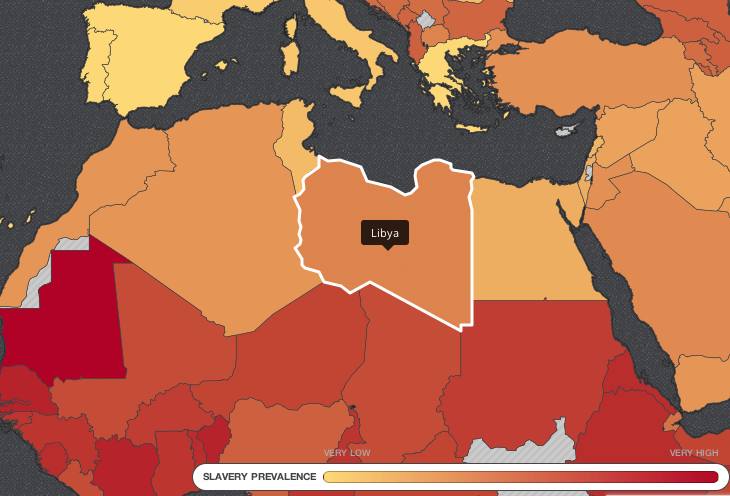
Libya comes out as being the worst country in North Africa for slavery by population figures (Photo: Global Slavery Index)
Tripoli, 18 October 2013:
With 17,693 people apparently living as modern-day slaves in Libya, according to the first-ever Global Slavery Index, the country is ranked by it as having the greatest prevalence of “slavery” in North Africa.
The actual figure, however, could be higher, with up to 19,000 people estimated to be living in slave-like conditions in the country.
Modern slavery takes many forms and is known by many names, the organisers of the report said. “Whether it is called human trafficking, forced labour, slavery or slavery-like practices, victims of modern slavery have their freedom denied, and are used and controlled and exploited by another person for profit, sex, or the thrill of domination.”
The new annual report, produced by anti-slavery organisation, the Walk Free Foundation, has ranked Libya 78th in a list of the 162 countries included in the study, which shows estimated modern slavery figures by population.
The figures make Libya the worst for slavery in North Africa, with Algeria ranked at 91, Morocco at 93, Tunisia at 122 and Egypt at 113. Even though Algeria and Egypt have higher actual numbers of modern-day slaves (up to 74,000 in Algeria and 75,000 in Egypt), by population figures, Libya fares the worst.
Mauritania, where slavery is deeply entrenched, ranked number one in the index. Despite having a population of only 3.8 million, between 140,000 and 160,000 people are “enslaved” there, according to the report.
The Middle East and North Africa account for 2.46 percent of the world’s 29.6 million people living in modern “slavery”, the foundation said, with migrant workers identified as particularly vulnerable in the region. It also had the highest measured level of discrimination against women – reflected in high levels of forced and child marriages – as well as widespread exploitation of female domestic workers.
Although the majority of modern-day slaves were in Africa and Asia, the report pointed out that no continent was completely free from slavery. The UK, Ireland and Iceland shared 160th ranking, having the lowest numbers of slaves. However, even the UK has more than 4,000 people living as “slaves”, according to the Global Slavery Index.
Calculations for the report were made by looking at three factors: estimated prevalence by population, a measure of child marriage, and data on human trafficking both in and out of the country. The Walk Free Foundation intends that the Global Slavery Index will be a tool that can help end modern slavery.
The figures do not appear to include the widespread practice in some Gulf and other countries, seen by many as tantamount to traditional slavery, whereby workers, mainly from Asia, have their passports taken away from their by their employers, their promised salaries slashed or not paid at all for months, are not allowed to travel or change jobs without their employers’ permission or leave the country.
The full report can be read here.
Economic news and the Oil Industry....
Wintershall production down: security impedes maintenance
By Nigel Ash

Tripoli, 15 October 2013:
German oil firm Wintershall, whose production from its two onshore concessions is currently halted by the eastern oil terminals blockade, also saw a near ten percent year-on-year drop in output in the second quarter of this year, because of planned field maintenance.
Production stood at 73,000 b/d compared with 80,000 b/d for the same period in 2012.
Some might consider Wintershall unlucky to choose to cut production voluntarily to allow maintenance, while at present, its output from blocks C96 and C97 has had to be halted because of the shutdown of the export terminals. Production at the offshore 45,000 b/d Al Jurf field, where the firm has a ten percent stake in operating company Mabruk Oil, has been unaffected.
A Wintershall spokesman told the Libya Herald today: “ It is currently unclear when the blockade of the export terminals will be lifted and how quickly production in the Libyan Desert can be resumed.” The spokesman went on to say that the firm was using the interruption to carry out more maintenance work and tests. “We are in close contact with the NOC and other companies. However, Wintershall does not have any influence on the solution to the current situation”.
The German company, a subsidiary of chemicals giant BASF, has been trying to bump its production back up to the pre-Revolution level of 100,000 b/d. Part of the trouble has been security concerns which, as with GECOL’s power generation contracts, have affected the readiness of service companies to send their specialists to Libya.
The Wintershall spokesman admitted this was a problem. “At the moment the return of some of the necessary expertise and services to Libya is being delayed because of security concerns. We would like to reach the pre-crisis production level of 100,000 b/d again as quickly as possible. It is not currently possible to say when this will happen.”
The spokesman also noted that there continued to be limits to the export infrastructure, despite the availability of a new replacement pipeline – owing to protests and strikes, most of them the loading terminals.
Back in March, the prospects had seemed very different. Production was then rising faster than expected and Wintershall shared the government’s optimism that the country might be edging towards 2 million b/d by sometime next year.
Wintershall had been the first foreign oil company to return to Libya after the revolution, during which it had paid all its staff and done its best to look after their welfare. Moreover because NOC did not have the available funds to overcome a bottleneck caused by degraded pipeline infrastructure, the German firm financed and project-managed the construction of a new 52 kilometre pipeline, linking its concession in block C96 with the Amal field. From there oil is transported to the export terminals at Ras Lanouf. This still remains the largest civil engineering project yet undertaken in the Libya since the revolution.
Working with NOC subsidiary AGOCO (Arabian Gulf Oil Company), the project was completed in record time and within budget. The original projected cost was €31.5 million, but sources close to the project say it came in at €27 million.
Million dinar Eid bank heist
By Ashraf Abdul-Wahab.
Tripoli, 17 October 2013:
Thieves decided to celebrate Eid by helping themselves to a million dinars from a bank in Ajilat, south west of Sabratha. They cut their way into the town’s Wahda bank on Tuesday, the first day of Eid, using an acetylene torch. According to local sources they took LD 1,031,000.
The methodology – use of acetylene equipment to cut a way into the premises – was almost the same as a bank robbery in Bani Walid two months ago. In that case, however, the thieves got away with just LD 3,000.
So far there are no clues as to the robbers identities. They left their acetylene torch at the scene of the crime.
Benghazi agency buys 50,000 tons of wheat
By Hadi Fornaji.
Tripoli, 17 October 2013:
The government grain-purchasing agency in Benghazi is reported to have invited tenders for the supply of 50,000 tons of wheat flour.
European traders told the Reuters news agency that the tenders must be submitted by this coming Monday. The invitation is believed to have come from Matahan agency which operates out of both Benghazi and Tripoli. It is responsible for the bulk of the country’s grain purchases.
One concern will be the risk premium that Libya may have to pay any supplier. At the end of last year, in one publicised deal, it was revealed that Matahan had had to pay $395 a ton c&f (cost and freight) for 30,000 tons of soft wheat, whereas Jordan, with more expensive shipping costs had paid only $378 a ton for a higher quality wheat. Traders supplying Libya have claimed delayed settlements, as well as enduring political instability are behind the premiums.
The political scene....
Attorney General’s office denies making Zeidan bribery allegations
By Libya Herald staff.
Tripoli, 17 October 2013:
An adviser to Attorney General, Abdel Qadar Radwan, has denied saying anything about Libyan politicians being involved in trying to bribe those involved in the eastern oil terminals lockdown.
Earlier media reports claimed that he had said that documents found inside Ali Zeidan’s briefcase, when he was kidnapped by members of the Libyan Revolutionaries Operations Room in collaboration with the Counter Crime Agency, proved the Prime Minister’s involvement in trying to bribe to Ibrahim Jedhran to reopen the terminals.
In a statement today, Radwan categorically denied the reports, saying that the investigation into what had happened was still ongoing and that no statements whatsoever had been made.
Last month, Ibrahim Jadhran revealed that the then head of the Congress energy committee, Naji Mukhtar, had given his brother Salem cheques to the value of LD 30 million, claiming that these were bribes designed to reopen the oil terminals and that the Prime Minister had been involved in the plan.
Zeidan has firmnly denied this.
Last Update: Friday, 18 October 2013 KSA 10:00 - GMT 07:00
Militia rivalries threaten new war in post-revolt Libya
Reuters, Tripoli
When gunmen snatched Libyan Prime Minister Ali Zeidan from his Tripoli hotel last week, it was a rival armed militia he thanked for his rescue hours later.
Even for Libyans accustomed to their democracy’s unruly beginnings, the drama at the Corinthia Hotel was a startling reminder of the power former fighterswield two years after they ousted Muammar Gaddafi, and the dangers of their rivalry.
Police and troops from Libya’s nascent army were at the scene, but the former militiamen showed they are the arbiters in a struggle between rival tribal and Islamist leaders over the post-revolution spoils of the North African oil producer.
Between them, they have edged Libya close to a new war that threatens the democratic gains of the NATO-backed revolt.
Too weak to take back control of a country awash with Gaddafi-era weapons, Libya’s central government has been forced to try co-opt militias into semi-official security services over which it exercises little control.
“We want to build a state with an army, police and institutions, but there are some people who want to obstruct this,” Zeidan, still in his pyjamas, told reporters after his release, referring to critics in parliament who had been planning a vote of no confidence, accusing him of failing on security.
Tripoli has been spared the major militia clashes seen in the eastern city of Benghazi. But the standoff is evident; gunmen from two rival groups sit in pickup trucks mounted with anti-aircraft cannons in different parts of the capital.
Tripoli has been spared the major militia clashes seen in the eastern city of Benghazi. But the standoff is evident; gunmen from two rival groups sit in pickup trucks mounted with anti-aircraft cannons in different parts of the capital.
In the east, the Libya Shield Force and Islamist militias drawn from anti-Gaddafi fighters based in the country’s fertile coastal areas and their commanders from Misrata city are entrenched at the Mittiga air base.
Across the city, powerful tribal Zintan militia, part of a loose alliance of mostly secular Bedouin groups from the desert interior, once recruited into Gaddafi’s security forces, control an area around Tripoli’s international airport.
The militia rivalries mirror a struggle within Libya’s fragile government, where the secular tribal alliance controls the defense ministry and the Islamist-leaning Libya Shield Force works under the interior ministry.
Parliament is split on similar lines, with a secular National Forces Alliance at loggerheads with the political wing of the Islamist Muslim Brotherhood over Libya’s future.
Zeidan’s captors, allied to the Shield Force, said they were motivated by anger over a U.S. raid to capture a top al-Qaeda suspect in Tripoli. The premier, freed by a defense ministry-allied militia, called his abduction an attempted coup.
Tensions with the Islamists have risen since the premier’s September visit to Egypt, where they accused him of endorsing the military’s ouster of Islamist President Mohammed Mursi.
“The political outcome of the revolution hasn’t been finalized and people still think there are things to be won and things to be lost,” a Libya-based Western diplomat said.
Revolution not finalized
Zeidan had been held in a government office by gunmen from an Islamist militia allied to the Shield Force. Details of his release are still hazy, but a loyal militia fired rocket-propelled grenades outside the office just beforehand.
Riccardo Fabiani, a North Africa analyst with Eurasia Group said militias appeared to be using their muscle for specific demands. But that might spin out of control if accusations Zeidan’s political foes orchestrated his abduction proved true.
“That would significantly alter the outlook and could plunge Libya into chaos, as other groups would have a reason to rise up against an attempted coup.”
In Benghazi, regional capital of the oil-rich eastern Libya, where Islamist militants attacked the U.S. embassy a year ago, militiamen backed by the army clashed earlier this year with the Libya Shields Force. More than 30 people were killed.
For months, militiamen commanded by a former security chief have held key ports in the east, halving the oil exports of the OPEC member, Africa’s third largest producer and a key supplier to Europe. A powerful western tribal militia has kept Gaddafi’s captive son in its desert stronghold.
Even before the premier’s abduction, the fight had come to Tripoli when Zintan fighters went on a rampage of looting in July in Abu Salim, a residential area, to avenge the death of several of their men by their Islamist leaning rivals.
The Zintans brought out heavy armored vehicles looted from Gaddafi’s bases and burned down the Islamist office. Only intervention by tribal elders averted a wider militia war.
Militias take pay, not orders
More than 225,000 Libyans are registered in dozens of militias under nominal state control. They receive government salaries but act autonomously, taking orders from local commanders or their affiliated political leaders and have resisted campaigns to recruit them into the security forces.
Libya is still negotiating with Britain, Turkey and Italy over training for its nascent armed forces, but NATO said last week it was still considering how the security situation on the ground might affect its assistance.
U.S. military training is in the planning stages, and Britain has said its main training may start early next year.
Western powers worry that the vast uncontrolled regions of southern Libya have already become a haven for Islamist militants with links to local al-Qaeda branch. A weak state also gives militiamen little incentive to hand over their weapons.
“Some militias have started engaging in smuggling of weapons, drugs and refugees. They are unlikely to give up that business,” said another western diplomat in Tripoli. “And they won’t run out of weapons or ammunition any time soon.”
The Libya Shield Force was set up last year by the parliament fed up with government’s repeated failure to control tribal militias. Assembly members approved millions of dollars of budget allocations to re-equip it as a reserve army.
“With their arrival a balance of power returned to Tripoli,” said Ahmeida Dali, a GNC member who lobbied for the Shields Force to come into the capital.
Its arrival upset tribal Arab Bedouin militias, including the Warfalla, the country’s largest tribe, and the powerful Zintans, but was welcomed by many Tripoli residents fed up with unruly elements among the Zintans who ransacked Gaddafi’s palaces and seized weapons and funds before his final fall.
“We need them badly to prevent the city from being held hostage by these tribal Bedouin gangsters,” said Yousef Ashour, sipping Italian cappuccino in a cafe in the Qaraqesh upscale neighborhood of Tripoli.
Anti-Islamist leader Mahmoud Jibril, from the Warfalla tribe, has been promoting a revival of tribal alliances and his National Forces Alliance is unlikely to give up its state-funded militias to a national military under control of a rival.
Some tribal militias appear to be preparing for a possible showdown with their Islamist rivals over Tripoli.
“Al-Qaeda, the Salafis and the Shields are all the same,” said one tribal militia commander named Ali. “They should be wiped out. We won’t let them take over Libya.”
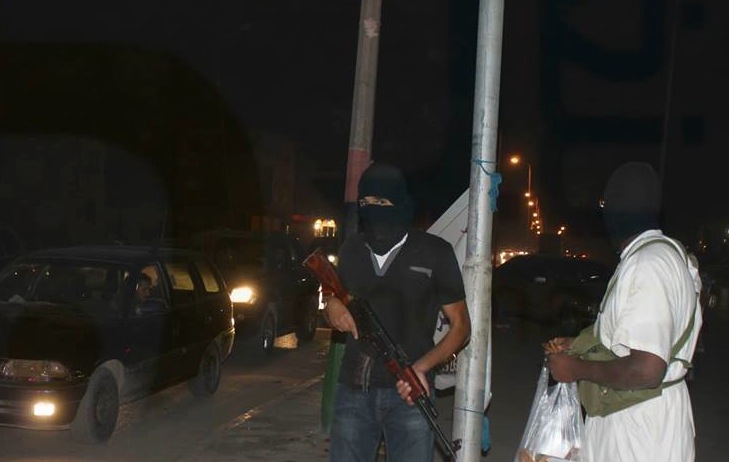
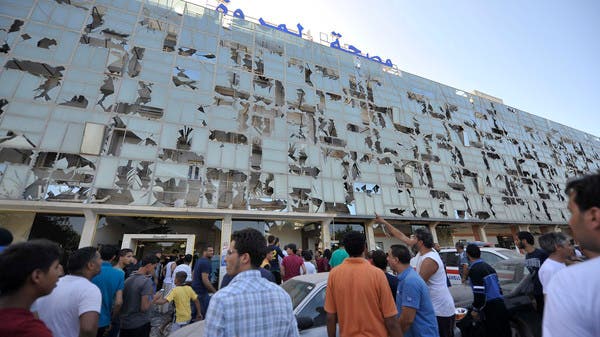

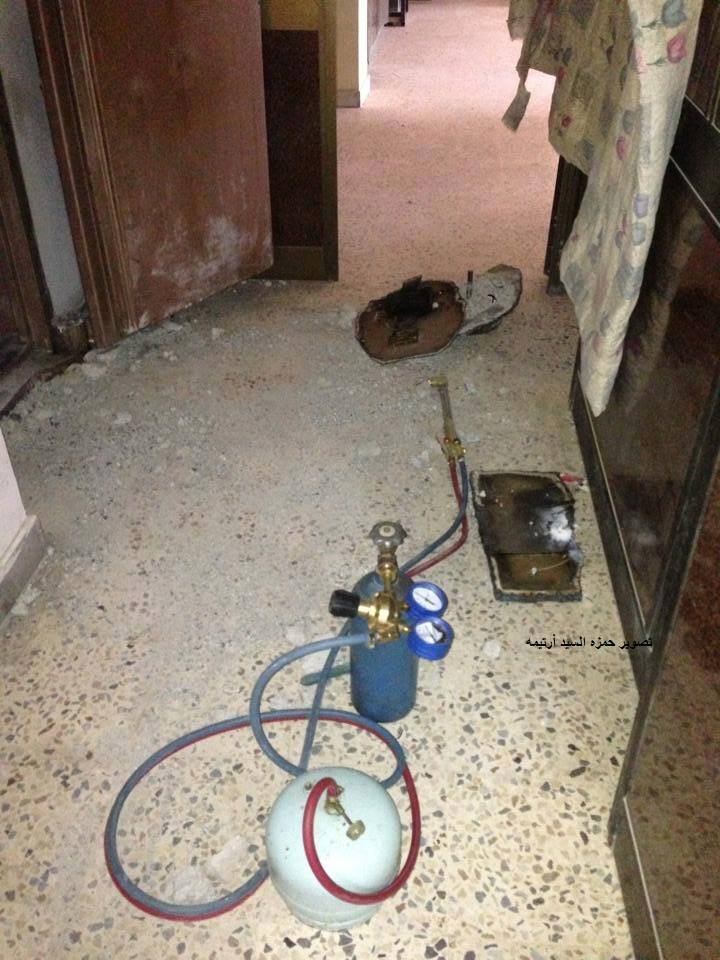
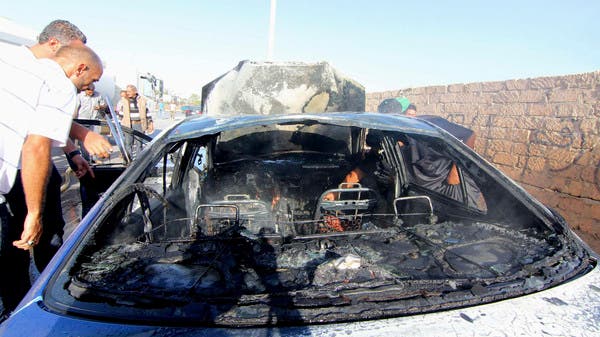
Morning Fredw,
ReplyDeleteSaudis are playing some kind of game, just not apparent what it is yet. They may be mean, nasty and disgusting but they are probably pretty cunning too. Hopefully whatever it is, it doesn't work.
The clusterf*ck that is Libya, sad but this must be how tptb wanted it to turn out. Otherwise the MSM would be non stop covering the situation to build a consensus to change it.
Have a good one,
Kev
We know the Saudis are displeased with how things are turning out in Syria and Iran as the US is not beating those war drums against either country presently. don't be shocked if somewhere down the road some event occurs to attempt to derail the processes to resolve grievances against both nations !
ReplyDeleteLibya was mugged and dumped along the side of the road - which must be what the PTB wanted to occur .....Media has moved on to the next headline opportunity they are allowed to cover.